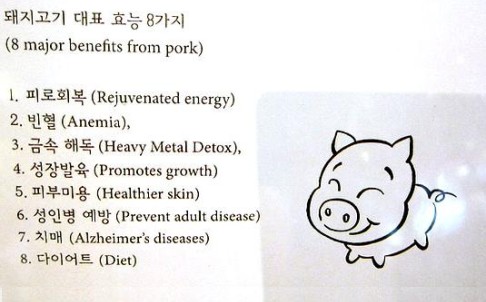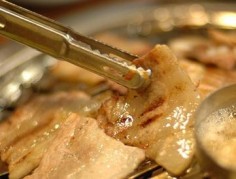South Korea’s solution to smog: eat more pork
The belief that pork detoxifies the lungs has prompted Koreans to consume more of the meat in light of recent pollution problems
PUBLISHED : Tuesday, 10 December, 2013, 7:01pm
UPDATED : Tuesday, 10 December, 2013, 7:33pm
Jeremy Blum [email protected]

According to traditional Korean superstition, pork has numerous health benefits. Photo: Flickr users 'Guzzle & Nosh'
Sales of pork have skyrocketed in South Korea, largely thanks to an old superstition that claims eating the meat helps the body dispose of pollutants taken in from breathing smog.
Homeplus, the second largest chain of Korean discount retail stores, reported that pork belly and leg sales rose 32 per cent in the first week of December with over 150 tonnes sold in total, Global Times reported, citing economic research in The Seoul Economic Daily.
The reason for pork’s sudden popularity is tied with South Korea’s increasing air smog, an intensifying issue the country has inherited from eastern mainland China.
Korea’s environmental ministry recently classified the density of Seoul’s daily air pollution as a level three out of six, and local media reports have gone so far as to call the Korean capital’s smog problem an “air raid” from China.
Precautions taken by Korean citizens have led to spikes in the sale of face masks and oral cleansers, and this trend has now spread to pork.
According to Kang Hyung-sik, a Homeplus livestock supplier interviewed by The Seoul Economic Daily, the unsaturated fatty acids in pork can effectively discharge heavy metal particles such as arsenic and lead that accumulate in the lungs after breathing in pollutants.

A strip of sizzling pork belly. Photo: Screenshot via huanqiu.com
There is no actual scientific proof linking pork consumption with these effects, but Kang’s statements are analogous with the traditional Korean belief that pork belly – called “samgyeopsal” in Korean - is a health food rich in vitamin B that can lower cholesterol, detoxify the lungs and cleanse the skin.
“Samgyeopsal is named after its three layers of lean meat and fat. It is the favourite pork part of many Koreans…[and] the consumption of pork belly in Korea is astronomical,” reported Korea AgraFood, a Korean magazine on agricultural products and food culture. “There is also a popular belief that eating pork belly after doing a big cleanup or working at a dusty place can sweep away all the dirt in the throat.”
Pork’s ability to “sweep away all the dirt in the throat” is not a common belief for many Chinese, who took to social networks like Sina Weibo to share the news and voice their scepticisms about the meat’s healing properties.
“It seems that smog and the number of folks suffering from lung cancer are not the only things that have been increasing recently,” one Weibo netizen remarked. “The number of Korean people getting fat from eating pork is about to increase too.”
